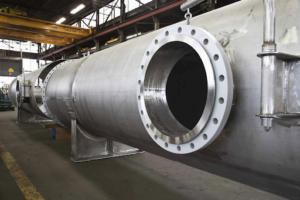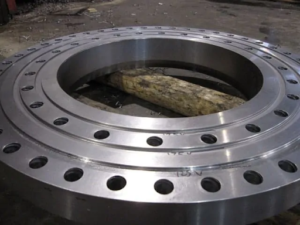Body flanges are widely used in a variety of industries. Body flanges are important components in many industries because they prevent leaks, provide structural support, allow for easy access, and are versatile.
Image Source: Texas Flange
Importance of Body Flanges
Body flanges are important for a variety of reasons. They:
- Prevent leaks:
Body flanges create a tight seal between two pieces of equipment, preventing leaks of fluids or gases. This is especially important in industries where leakage could be hazardous or costly, such as the oil and gas industry or the chemical processing industry.
- Provide structural support:
Body flanges can also provide structural support for equipment, such as vessels and tanks. This is important in industries where equipment is subject to high pressures or temperatures, such as the power generation industry or the food and beverage processing industry.
- Allow for easy access:
Body flanges can be removed to allow for easy access to equipment for maintenance or repairs. This can save time and money, and it can help to reduce downtime.
- Versatile:
Body flanges can be used in a wide variety of applications, making them a versatile and essential component in many industries.
Major Applications of Body Flanges
Here are the major industrial uses of body flanges:
 Image Source: Texas Flange
Image Source: Texas Flange
1. Oil and Gas
In the oil and gas industry, body flanges are used to:
- Connect sections of oil and gas pipelines
- Attach valves, fittings, and other equipment to pipelines
- Connect vessels, tanks, and other equipment in oil and gas processing facilities
Body flanges in the oil and gas industry must be able to withstand high pressures and temperatures, as well as corrosive and abrasive fluids. For example, body flanges are used to connect pipelines that transport crude oil from the wellhead to processing facilities. Body flanges are also used to connect vessels and tanks that store crude oil and other oil and gas products.
2. Chemical Processing
In the chemical processing industry, body flanges are used to:
- Connect vessels, tanks, and other equipment that contain and transport corrosive or hazardous chemicals
- Connect pipes and fittings that carry corrosive or hazardous chemicals
Body flanges in the chemical processing industry must be able to withstand a wide range of chemicals, including acids, bases, solvents, and oxidizing agents. They must also be able to withstand high pressures and temperatures. For example, body flanges are used to connect vessels and tanks that contain hazardous chemicals, such as sulfuric acid and nitric acid. Body flanges are also used to connect pipes and fittings that carry these chemicals throughout the chemical processing plant.
3. Power Generation
In the power generation industry, body flanges are used to:
- Connect pipes, valves, and other equipment that carry steam, water, and other fluids in power plants
- Connect vessels, tanks, and other equipment that contain steam, water, and other fluids in power plants
Body flanges in the power generation industry must be able to withstand high pressures and temperatures, as well as corrosive and abrasive fluids. They must also be able to withstand the vibrations and stresses associated with power plant operations. For example, body flanges are used to connect the boiler to the turbine in a power plant. Body flanges are also used to connect the condenser to the cooling tower.
4. Water and Wastewater Treatment
In the water and wastewater treatment industry, body flanges are used to:
- Connect pipes, valves, and other equipment that carry water and wastewater in water and wastewater treatment plants
- Connect vessels, tanks, and other equipment that contain water and wastewater in water and wastewater treatment plants
Body flanges in the water and wastewater treatment industry must be able to withstand a wide range of chemicals, including disinfectants, coagulants, and flocculants. They must also be able to withstand high pressures and temperatures. For example, body flanges are used to connect the clarifier to the filter in a water treatment plant. Body flanges are also used to connect the pump to the storage tank.
5. Food and Beverage Processing
In the food and beverage processing industry, body flanges are used to:
- Connect pipes, valves, and other equipment that transport and process food and beverage products
- Connect vessels, tanks, and other equipment that contain food and beverage products
Body flanges in the food and beverage processing industry must be made of materials that are non-toxic and food-grade. They must also be able to withstand the cleaning and sanitation procedures used in food and beverage processing plants. For example, body flanges are used to connect the00000000000 mixer to the pasteurizer in a dairy processing plant. Body flanges are also used to connect the storage tank to the bottling line.
6. Pharmaceutical Manufacturing
In the pharmaceutical manufacturing industry, body flanges are used to:
- Connect pipes, valves, and other equipment that transport and process pharmaceutical products
- Connect vessels, tanks, and other equipment that contain pharmaceutical products
Body flanges in the pharmaceutical manufacturing industry must be made of materials that are non-toxic and biocompatible. They must also be able to withstand the cleaning and sterilization procedures used in pharmaceutical manufacturing plants. For example, body flanges are used to connect the reactor to the distillation column in a pharmaceutical manufacturing plant. Body flanges are also used to connect the storage tank to the packaging line.
Frequently Asked Questions (FAQs)
Q1. What are body flanges, and why are they important in industrial applications?
Body flanges are circular discs with holes that play a crucial role in connecting pipes, valves, and equipment in industrial settings. They are essential for creating leak-free connections, enhancing structural integrity, and facilitating maintenance in piping systems.
Q2. What materials are commonly used in manufacturing body flanges?
Body flanges are typically made from materials like carbon steel, stainless steel, and various alloy steels. The choice of material depends on the specific industry, environmental factors, and the type of fluid or gas being transported.
Q3. What are the safety considerations when using body flanges in high-pressure systems?
Safety is paramount when using body flanges in high-pressure systems. It’s essential to ensure proper material selection, flange design, and installation to handle the specific pressure and temperature conditions. Regular inspection and maintenance are also critical to prevent failures.
Q4. How do I choose the right type of body flange for my industrial application?
The choice of body flange type depends on the specific requirements of your industry and application. Consider factors like pressure, temperature, fluid type, and environmental conditions when selecting the appropriate flange type.
Q5. Are there any maintenance tips to ensure the longevity of body flanges?
Yes, maintaining body flanges is essential to prevent leaks and ensure their longevity. Regular inspections, torque checks, and gasket replacement as needed are key maintenance activities. Proper storage and handling also play a role in extending their service life.
Q6. Are there specific regulations or standards for using body flanges in different industries?
Yes, various industries have specific regulations and standards governing the use of body flanges to ensure safety and compliance.
Q7. How do body flanges contribute to environmental protection in industrial settings?
Body flanges play a role in environmental protection by ensuring the integrity of systems that transport hazardous or polluting substances.
Q8. Can body flanges be customized for unique industrial applications?
Yes, many manufacturers offer custom body flange solutions to meet the unique requirements of different industrial applications. Customization may involve material selection, dimensions, and flange design.
Conclusion
In conclusion, Body flanges are important components in many industries because they prevent leaks, provide structural support, allow for easy access, and are versatile. They are used in the oil and gas industry, chemical processing industry, power generation industry, water and wastewater treatment industry, food and beverage processing industry, and pharmaceutical manufacturing industry.
To find more in-depth information, resources, and expert guidance on body flanges, visit the website: https://www.texasflange.com/
